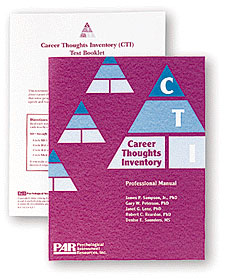CAREER THOUGHTS INVENTORY
.
.

Helps individuals identify, challenge, and alter negative career thoughts that interfere with effective career decision making.
.
.
PURPOSE: Assist in career problem solving and decision making in adults, college students, and high school students
AGE RANGE: Adolescen, Adult and Elder Adult
.
.
.
The CTI is a self-administered and objectively scored assessment designed to improve the effectiveness of career counseling and guidance for adults, college students, and high school students. The CTI can be used to identify an individual who is likely to need counseling assistance; to identify the nature of an individual’s career problems; and to help an individual identify, challenge, and alter negative career thoughts that interfere with effective career decision making.
Clients complete the CTI Test Booklet, responding to each of the 48 items using a 4-point rating scale (Strongly Disagree to Strongly Agree). The CTI can be completed in 7 to 15 minutes and hand-scored and profiled in about 5 minutes. The CTI yields a CTI Total score (a single global indicator of negative thinking in career problem solving and decision making) as well as scores on 3 construct scales:
The CTI Workbook helps clients to understand the nature of their negative thoughts as well as how much help they are likely to need in order to make effective use of career services. The Workbook is also useful in counseling interventions to help individuals challenge and alter specific negative thoughts. A decision-making checklist, included in the Workbook, indicates useful areas for specific instruction in career decision making. In evaluation, the CTI provides a measure of learning outcomes associated with various counseling and guidance interventions.
The CTI was standardized on a national sample of over 1,500 adults, college students, and high school students. It has been shown to be a reliable and valid measure of negative career thinking. The scales of the CTI are internally consistent (mean a = .86 for construct scales in the standardization sample) and stable (test-retest r for the CTI Total score = .77), and the instrument exhibits reasonable content, convergent, predictive, and construct validity. The CTI Professional Manual describes test development, reliability and validity studies; guidelines for administration, scoring, and interpretation; case studies, and ideas for interventions.
.
.


